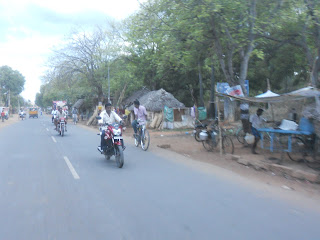

Today we spent our class time going more in-depth about the ICTPH community health worker model. I know I've mentioned it before, but I'll briefly outline it again. It's pretty cool. So ICTPH hires one doctor and one nurse to work at each RMHC. The doctors and nurses review applications and interview community health worker candidates. This helps to ensure that the doctors, nurses and community health workers work well together, as they will be sharing information. All health workers are women, over the age of 18 and are leaders in their community dedicated to improving health. The health workers visit families in their catchment area, doing preventive health screenings, providing referrals and and providing follow up services. Each worker serves about 200 households, most of whom already are familiar with the health workers. The workers then report their work to the RMHC so it can be recorded in the family's medical records.
After talking with the health workers, the GI team interviewed the village president. We learned about how people in the community perceive diarrheal disease in children. Parents take their children to a health care provider, usually the most expensive one that they can afford. We also heard the ORS (oral rehydration therapy, which is the most effective treatment to prevent dehydration and it's complications) isn't widely administered. This may be because parents don't perceive it to be effective.
We also were invited into the home of a couple who was taking care of their grandson. It's been really really humbling how kind people have been to us since we've been here. The family welcomed us and gave us chairs, and told us "when you're in our home you're our family." They even picked some mangoes off their tree and gave them to us.
We spent some time just talking about India and the US and learning a bit about the family. We then asked them some of the same questions about their perceptions of diarrheal disease and sanitation. Surprisingly, the family asked us for our advice on how to prevent disease in their grandson. It was really interesting to have a conversation with them about some of the prevention methods we had been researching and how they thought they might work in their community.
Overall, a few things I'll take with me:
Just chatting with people is great. I mean, go figure, it's important to feel comfortable, and in turn, help people to feel comfortable around you. I'm hoping that I'm going into people's villages with an open mind and open ears, and can just soak up all of the interesting things that we are told. It's really cool too that people are so open and happy to talk with us. And are patient with us. I really couldn't be learning anything like this in a classroom in St. Louis. Props to the ICTPH staff and the villagers who have really taken the time and energy to help this gaggle of Amuricans learn about health and India and maybe a bit about some larger concepts too...
To put this concretely, I found it challenging to frame questions in a way that were open-ended and didn't come across as "ummm so why don't you wash your hands, huh?" I'm here to learn about whatever it is people report, because that's the best evidence for designing an intervention that will work in this environment. But I also know certain things usually work to prevent disease-- hand washing, water treatment, etc. Again, thanks to Sangeetha, our ICTPH team leader, for talking with us about this and helping us ask questions in the most appropriate way...
I look forward to continuing to develop in this area...another thing we certainly wouldn't be doing back on Danforth Campus...
Now, an early bedtime for another early track-date tomorrow morning...
No comments:
Post a Comment